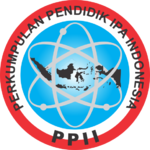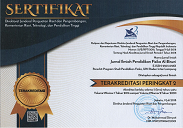Project-Based (PjBL) and Guided Inquiry Learning: Students’ Response to Rectilinear and Circular Motion Phenomena
Abstract
Keywords
Full Text:
PDFReferences
Acar, O., & Patton, B. R. (2012). Argumentation and Formal Reasoning Skills in an Argumentation- Based Guided Inquiry Course. Procedia - Social and Behavioral Sciences, 46, 4756–4760. https://doi.org/10.1016/j.sbspro.2012.06.331
Adnan, & Bahri, A. (2017). Beyond Effective Teaching: Enhancing Students’ Metacognitive Skill Through Guided Inquiry. IOP Conf.Series: Journal of Physics, (954). https://doi.org/10.1088/1742-6596/954/1/012022
Aini, Q., Lesmono, A. D., & Wahyuni, S. (2015). Pembelajaran Fisika Menggunakan Model Project Based Learning dengan Memanfaatkan Bahan Bekas. Jurnal Pembelajaran Fisika, 7(1), 1–7.
Aldabbus, S. (2018). Project-Based Learning: Implementastion & Challenges. Internatioanl Journal of Educationm Learning and Development, 6(3), 71–79.
Almuntasheri, S., Gillies, R. M., & Wright T. (2016). The Effectiveness of a Guided Inquiry-Based, Teachers’ Professional Development Programme on Saudi Students’ Understanding of Density. Science Education International, 27(1), 16–39.
Anazifa, R. D., & Djukri. (2017). Project- Based Learning and Problem-Based Learning: Are They Effective to Improve Student’s Thinking Skills? Jurnal Pendidikan IPA Indonesia, 6(2), 346–355. https://doi.org/10.15294/jpii.v6i2.11100
Asnidar, Khabibah, S., & Sulaiman, R. (2018). The Effectiveness of Guided Inquiry Learning for Comparison Topics. Journal of Physics: Conference Series, 947(1). https://doi.org/10.1088/1742-6596/947/1/012033
Aulia, E. V, Poedjiastoeti, S., & Agustini, R. (2018). The Effectiveness of Guided Inquiry-Based Student Worksheets on Students’ Generic Science Skills. Journal of Physics: Conference Series, (947). https://doi.org/10.1088/1742-6596/1088/1/012106
Baran, M., & Maskan, A. (2010). The Effect of Project-Based Learning on Pre-Service Physics Teachers’ Electrostatic Achievements. Cypriot Journal of Educational Sciences, 5, 243–257.
Barthlow, M. J., & Watson, S. B. (2014). The Effectiveness of Process-Oriented Guided Inquiry Learning to Reduce Alternative Conceptions in Secondary Chemistry. School Science and Mathematics, 114(5), 246–255.
Berge, M. (2017). The Role of Humor in Learning Physics: a Study of Undergraduate Students. Research in Science Education, 47(2), 427–450. https://doi.org/10.1007/s11165-015-9508-4
Cakır, N. K. (2017). Effect of 5E Learning Model on Academic Achievement, Attitude and Science Process Skills: Meta-Analysis Study. Journal of Education and Training Studies, 5(11), 157. https://doi.org/10.11114/jets.v5i11.2649
Castro, J. A. F., & Morales, M. P. E. (2017). “Yin” in a Guided Inquiry Biology Vlassroom - Exploring Student Challenges and Difficulties. Journal of Turkish Science Education, 14(4), 48–65. https://doi.org/10.12973/tused.10212a
Chiang, C. L., & Lee, H. (2016). The Effect of Project-Based Learning on Learning Motivation and Problem-Solving Ability of Vocational High School Students. International Journal of Information and Education Technology, 6(9), 709–712. https://doi.org/10.7763/IJIET.2016.V6.779
Cool, V. A., & Keith, T. Z. (1991). Testing a Model of School Learning: Direct and Indirect Effects on Academic Achievement. Contemporary Educational Psychology, 16(1), 28–44. https://doi.org/10.1016/0361-476X(91)90004-5
Ergül, N. R., & Kargın, E. K. (2014). The Effect of Project Based Learning on Students’ Science Success. Procedia - Social and Behavioral Sciences, 136, 537–541. https://doi.org/10.1016/j.sbspro.2014.05.371
Esteban, S., & Arahal, M. R. (2015). Project Based Learning Methodologies Applied to Large Groups of Students: Airplane Design in a Concurrent Engineering Context. IFAC-Papers Online, 48(29), 194–199. https://doi.org/10.1016/j.ifacol.2015.11.236
Fajarwati, S. K., Susilo, H., & Indriwati, S. E. (2017). Pengaruh Project Based Learning Berbantuan Multimedia terhadap Keteampilan Memecahkan Masalah dan Hasil Belajar Pskomotor Siswa Kelas XI SMA. Jurnal Pendidikan: Teori, Penelitian Dan Pengembangan, 2(3), 315–321.
Fernandes, M. A. (2016). Project Based Learning Applied to An Embedded Systems Course. International Journal of Electrical Engineering Education, 54(3), 223–235. https://doi.org/10.1177/0020720916675830
Fini, E. H., Awadallah, F., Parast, M. M., & Abu-Lebdeh, T. (2018). The Impact of Project-Based Learning on Improving Student Learning Outcomes of Sustainability Concepts in Transportation Engineering Courses. European Journal of Engineering Education, 43(3), 473–488. https://doi.org/10.1080/03043797.2017.1393045
Gerhana, M. T. C., Mardiyana, M., & Pramudya, I. (2017). The Effectiveness of Project Based Learning in Trigonometry. Journal of Physics: Conference Series, 895(1). https://doi.org/10.1088/1742-6596/895/1/012027
Gunawan, Sahidu, H., Harjono, A., & Suranti, N. M. Y. (2017). The Effect of Project Based Learning with Virtual Media Assistance on Student’s Creativity in Physics. Cakrawala Pendidikan, 2, 167–179.
Heckendorn, R. B. (2003). Building a Beowulf: Leveraging Research and Department Needs for Student Enrichment via Project Based Learning. Computer Science Education, 12(4), 255–273. https://doi.org/10.1076/csed.12.4.255.8620
Kean, A. C., & Kwe, N. M. (2014). Meaningful Learning in the Teaching of Culture: The Project Based Learning Approach. Journal of Education and Training Studies, 2(2), 189–197. https://doi.org/10.11114/jets.v2i2.270
Khan, M. S., Hussain, S., Ali, R., Majoka, M. I., & Ramzan, M. (2011). Effect of Inquiry Method on Achievement of Students in Chemistry At Secondary Level. International Journal of Academic Research, 3(1), 955–960.
Kızkapan, O., & Bektaş, O. (2017). The Effect of Project Based Learning on Seventh Grade Students’ Academic Achievement. International Journal of Instruction, 10(1), 37–54. https://doi.org/10.12973/iji.2017.1013a
Kokotsaki, D., Menzies, V., & Wiggins, A. (2016). Project-Based Learning: A Review of the Literature. Improving Schools, 19(3), 267–277. https://doi.org/10.1177/1365480216659733
Makahinda, T. (2018). The Effect of Learning Based on Technology Model and Assessment Technique toward Thermodynamic Learning Achievement. IOP Conference Series: Materials Science and Engineering, 306(1). https://doi.org/10.1088/1757-899X/306/1/012125
McLaughlin, S. (1996). Rounding Up Students’ Conceptios on Circular Motion. Iowa Science Teachers Journal, 33(2), 7–15.
Mioduser, D., & Betzer, N. (2008). The contribution of project-based-learning to high-achievers’ acquisition of technological knowledge and skills. International Journal of Technology and Design Education, 18(1), 59–77. https://doi.org/10.1007/s10798-006-9010-4
Nisa, E. K., Koestiari, T., Habibbulloh, M., & Jatmiko, B. (2018). Effectiveness of guided inquiry learning model to improve students’ critical thinking skills at senior high school. Journal of Physics: Conference Series, 997(1). https://doi.org/10.1088/1742-6596/997/1/012049
Nivalainen, V., Asikainen, M. A., & Hirvonen, P. E. (2013). Open Guided Inquiry Laboratory in Physics Teacher. Journal of Science Teacher Education, 24(3), 449–474. https://doi.org/10.1007/s10972-012-9316-x
Ratnasari, D., Sukarmin, S., Suparmi, S., & Aminah, N. S. (2017). Students’ Conception on Heat and Temperature toward Science Process Skill. Journal of Physics: Conference Series, 895(1). https://doi.org/10.1088/1742-6596/895/1/012044
Rosales JR, J. J., & Sulaiman, F. (2016). Students’ Personal Interest Towards Project – Based Learning. PEOPLE: International Journal of Social Sciences, 2(1), 214–227. https://doi.org/10.20319/pijss.2016.s21.214227
Silaban, A., & Simanjuntak, M. P. (2018). Pengaruh Model Pembelajaran Inkuiri Terbimbing terhadap Ketrampilan Proses Sains dan Pemahaman Konsep Fisika. Jurnal Pendidikan FIsika, 7(1), 20–24.
Srikoon, S., Bunterm, T., Nethanomsak, T., & Tang, K. N. (2018). Effect of 5P Model on Academic Achievement, Creative Thinking, and Research Characteristics. Kasetsart Journal of Social Sciences, 39(3), 488–495. https://doi.org/10.1016/j.kjss.2018.06.011
Tamba, P., & Turnip, B. M. (2017). The Effect of Project Based Learning Model for Students ’ Creative Thinking Skills and Problem Solving. Journal of Research & Method in Education, 7(5), 67–70. https://doi.org/10.9790/7388-0705026770
Thomas, J. W. (2000). A Review of Research on Project-Based Learning. San Rafael: The Autodesk Foundation
Trianto. (2012). Model Pembelajaran Terpadu. Jakarta: Bumi Aksara.
Wafula, W. N., & Ongunya Odhiambo. (2016). Project Based Learning on Students’ Performance in the Concept of Classification of Organisms among Secondary Schools in Kenya. Journal of Education and Practice, 7(16), 25–31.
Watson, B., & Konicek, R. (1990). Teaching for Conceptual Change: Confronting Children’s Experience. Source: The Phi Delta Kappan, 71(9), 680–685.
DOI: http://dx.doi.org/10.24042/jipfalbiruni.v8i2.4422
Refbacks
- There are currently no refbacks.

Jurnal ilmiah pendidikan fisika Al-Biruni is licensed under a Creative Commons Attribution-ShareAlike 4.0 International License.
![]()







